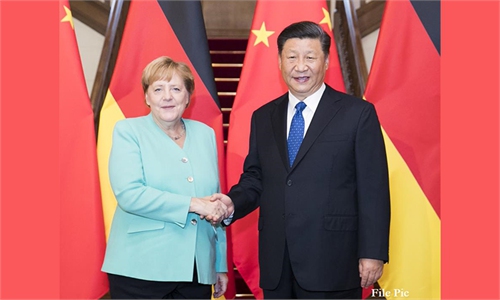
Olaf Scholz Photo: CFP
Although the Social Democratic Party of Germany (SPD), The Greens and the Free Democratic Party (FDP) have agreed to proceed from exploratory talks to coalition negotiations over establishing a new German administration, a positive for a stable transition, experts pointed to the possible risk and influence of an unclear China policy.
German Finance Minister Olaf Scholz said on Friday that the three parties had secured the basic principles for an alliance, and they would hold formal negotiations on the details as soon as possible. Scholz said on Wednesday that Germany was likely to have a new administration before Christmas, Reuters reported.
Through negotiation and compromise, the three parties have concluded agreements on multiple sectors, including climate goals, industrial renewal and tax and debt brakes, German media reported.
According to German media, FDP leader Christian Lindner said the negotiation offered new possibilities, and "marks a break with Germany's past political culture," which has attracted attention from Chinese observers.
Cui Hongjian, director of the Department of European Studies at China Institute of International Studies, told the Global Times on Sunday that among the three-way alliance, although China policy is not the key consideration of the three parties in current coalition negotiations, the Green Party and the FDP emphasize reform and change.
"Although the three parties share some common ground on EU strategic autonomy, the FDP and the Greens prefer to strengthen the so-called alliance of democracy and values. As a more experienced party in ruling, the SDP is more about ensuring the continuity of Germany's EU and external policies," Sun Keqin, a research fellow at the China Institutes of Contemporary International Relations, told the Global Times on Sunday.
Based on a joint statement released after preliminary talks on Friday, the three parties agree Germany will exit from coal-fired power stations by 2030.
The agreement the three parties reached may have a spillover influence on China and affect bilateral ties after it becomes policy, experts said.
The climate-friendly Greens and the pro-business FDP have previously been at odds over green issues. But if they agree on policy in the future, and become more aggressive with unrealistic high standards to place demands on developing countries, it could also affect China- Germany cooperation on green industries and climate change, Sun said.
The biggest variable affecting Germany's China policy is the US, Sun said, noting it remains to be seen how far the new German government will go with the climate and human rights cards to put pressure on China, catering to the US.
The foundation of China-Germany relations is very solid and the framework of Germany's China policy is stable. The two countries have more than 80 dialogue mechanisms to exchange views on economy, trade, environment, culture and science. China is Germany's most important trading partner, with trade in goods worth 212 billion euros ($246 billion), according to Germany's Federal Statistics Office in February.
As for decision-making of the three-way alliance, the foreign policy decision-making may fall into more internal games and reduced efficiency. And in the absence of an authoritative figure such as outgoing German Chancellor Angela Merkel, the risk of repeated policy conflicts will increase, Cui said.




